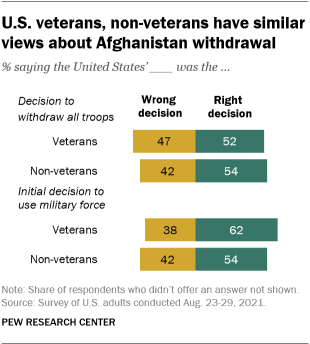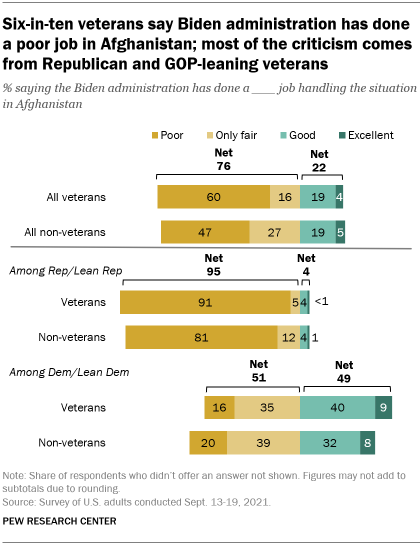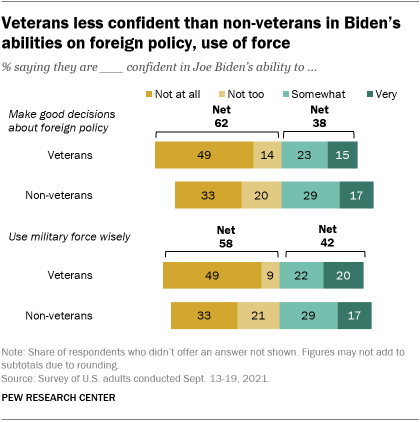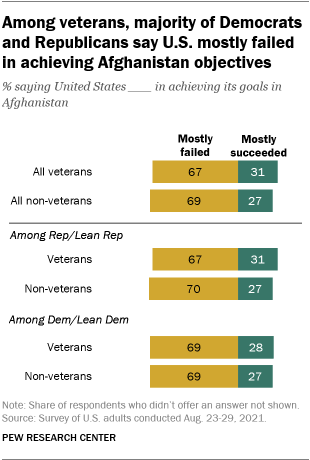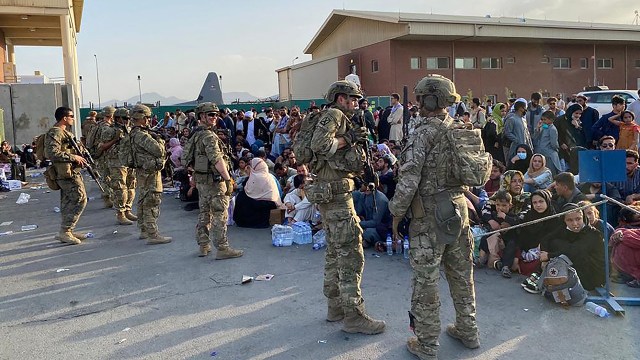
Amid the ongoing fallout over the American military’s withdrawal from Afghanistan, veterans and non-veterans in the United States largely align when it comes to the decision to pull all troops out of the country and on whether the overall mission there was a success or failure. But veterans are more critical than those who didn’t serve in the military when it comes to how President Joe Biden’s administration has dealt with the issue. In addition, veterans have less confidence than non-veterans in Biden’s ability to make good decisions about foreign policy and to use military force wisely, according to two new Pew Research Center surveys.
In a survey conducted Aug. 23-29 – before all American troops had left Afghanistan – 52% of military veterans said the U.S. decision to withdraw troops from the country was the right one, while 47% said it was wrong. The balance of opinion was roughly similar among adults who did not serve in the military, with 54% saying it was the right decision and 42% saying it was wrong.
Veterans and non-veterans were not as closely aligned in their views on the original mission in Afghanistan. Veterans were more likely than non-veterans to say the initial U.S. decision to use military force in that country was the right one (62% vs. 54%).
To assess how U.S. military veterans view recent events in Afghanistan and the Biden administration’s handling of those events, and how their views differ from adults who didn’t serve in the military, Pew Research Center conducted two surveys. The first, which was conducted between Aug. 23-29, 2021, surveyed 10,348 adults (including 979 veterans). Most of the interviewing for that survey occurred before the Aug. 26 suicide bombing at Kabul airport. The second survey, which was conducted Sept. 13-19, 2021, was among 10,371 adults (including 983 veterans).
Everyone who took part in both surveys is a member of the Center’s American Trends Panel (ATP), an online survey panel that is recruited though national, random sampling of residential addresses. This way nearly all U.S. adults have a chance of selection. The survey is weighted to be representative of the U.S. adult population by gender, race, ethnicity, partisan affiliation, education and other categories. Read more about the ATP’s methodology.
Here are the questions used for the August survey, along with responses, and the August methodology, and the questions used for the September survey and the September methodology.
Looking specifically at the Biden administration’s handling of the situation in Afghanistan, veterans’ views are more critical than those of non-veterans.
In a second survey by the Center, conducted Sept. 13-19, six-in-ten veterans say the Biden administration has done a poor job on this issue. This compares with 47% of non-veterans. On balance, both veterans and non-veterans have a negative view of Biden’s efforts in Afghanistan: 76% of veterans say his administration has done an only fair or poor job, as do 74% of non-veterans. Only about a quarter or fewer in either group say the administration has done an excellent or good job, with very few giving it an excellent rating (4% of veterans and 5% of non-veterans).
Views on U.S. policy toward Afghanistan – whether the recent withdrawal or the 2001 invasion – differ by party identification. Republicans and Republican-leaning independents are less supportive than Democrats and Democratic leaners of the decision to pull out all U.S. troops, and they are more supportive of the initial decision to use military force 20 years ago.
Similarly, there are deep partisan divides in attitudes about the current administration’s handling of the recent withdrawal, both among veterans and among the general public. The overall differences in views between veterans and non-veterans are partially a reflection of the partisan leanings of the veteran population. As a group, veterans are more likely than non-veterans to align themselves with the Republican Party. And veterans who identify as Republican or lean to the GOP are more than five times as likely as Democratic or Democratic-leaning veterans to say the Biden administration has done a poor job handling the situation in Afghanistan.
Among Republicans, veterans are somewhat more critical than non-veterans of the Biden administration’s handling of the situation in Afghanistan. Around nine-in-ten Republican veterans (91%) say the administration has done a poor job in this area, compared with 81% of Republican non-veterans. The dynamic is different among Democrats: Around half of Democratic veterans (49%) say Biden has done an excellent or good job handing things in Afghanistan, compared with a smaller share of Democratic non-veterans (39%).
Looking more broadly at assessments of Biden’s handling of foreign policy and military affairs, views differ between veterans and non-veterans, mainly at the extremes. Some 49% of veterans say they are not at all confident in Biden’s ability to make good decisions about foreign policy. This compares with 33% of non-veterans. Both veterans and non-veterans are more likely to raise doubts about Biden’s abilities in this area than they are to express confidence.
Similarly, 49% of veterans – compared with 33% of non-veterans – say they are not at all confident in Biden’s ability to use military force wisely. Again, both veterans and non-veterans are more likely to say they are not too or not at all confident in Biden when it comes to use-of-force decisions than to say they are somewhat or very confident in him.
Partisanship is strongly related to these views, as Republicans assess Biden’s abilities more negatively than Democrats. Even so, veterans stand out among Republicans in their criticism of the president’s ability to make the right decisions about foreign policy and use of military force. On both measures, 80% of Republican veterans say they are not at all confident in Biden’s abilities in these areas. By comparison, 67% of GOP non-veterans say they are not at all confident in Biden when it comes to making foreign policy decisions, and 65% say the same about his ability to use military force wisely. (The sample size for Democratic veterans on this question is too small to analyze.)
One area where veterans and non-veterans are largely in agreement, regardless of party, is in their assessments of the overall success or failure of the U.S. mission in Afghanistan. Two-thirds of all veterans say the U.S. mostly failed in achieving its goals in Afghanistan; 69% of all non-veterans say the same. Nearly identical shares of Republican and Democratic veterans (67% and 69%, respectively) say the U.S. failed its mission, and they don’t differ significantly from non-veterans in this regard.
Looking to the future, veterans and non-veterans have similar views when it comes to the threat the Taliban poses to U.S. security. Some 47% of all veterans and 45% of non-veterans say Taliban control of Afghanistan is a major threat to our security; 43% and 44%, respectively, say this poses a minor threat.
Among veterans, Republicans and Democrats have very different views on this question: 64% of GOP veterans see Taliban control as a major threat to U.S. security, compared with only 25% of Democratic veterans. These partisan patterns are similar among non-veterans.
Note: Here are the questions used for the August survey, along with responses, and the August methodology, and the questions used for the September survey and the September methodology.



